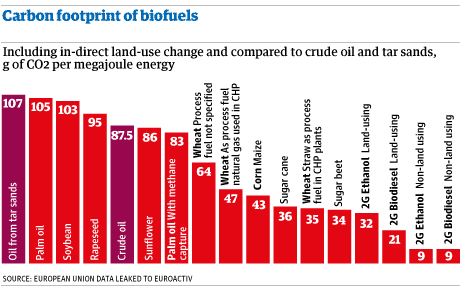Leaked data: Palm biodiesel as dirty as fuel from tar sands
There are good biofuels and bad biofuels and the worst are as filthy as the foulest fossil fuels. But the good biofuels are essential to tackling climate change
There are good biofuels and bad biofuels: the trick is telling one from the other. That's particularly difficult when trying to take account of the natural forests and wetlands that can destroyed in the drive to grow some biofuel crops. But we're getting closer, it seems, and palm oil and soy beans now appear utterly unsupportable as a source of biodiesel.
The new data comes from a leak obtained by EurActiv from the European Commission. The EC is considering what level of carbon emissions each type of biofuel causes once burned, after everything - including "indirect land-use change" - is taken into account.
It is obvious that for a biofuel to be useful in cutting the emissions driving global warming it needs to have a smaller carbon footprint than regular fuel from crude oil. So I have added the numbers for crude oil and oil from the highly-polluting tar sands for reference in the table below. The leaked biofuel numbers are, I'm told similar to several recent studies, and therefore credible.
Here's the data (the units are grams of carbon dioxide per megajoule energy of energy).

So palm oil and soy bean biodiesel is just a touch less polluting than fuel from tar sands: that's pretty damning. Maize and sugar do better than crude oil but still cause significant carbon emissions.
The better news comes from the second generation fuels (2G), particularly when the are "non-land using", i.e. when they use only waste such as straw. Factories doing this are setting up now in, for example, Italy. The "land-using" fuels are made from non-food crops, such as jatropha, but that can bring its own problems, as I saw for myself in Tanzania.
The EU's scheme for certifying biofuels as sustainable requires them to emit 35% less CO2 than regular fuel, increasing to 60% by 2018, making palm oil, soy bean, rapeseed and sunflower looking all but dead.
Palm oil biodiesel also received another blow on Friday, with the US Environmental Protection Agency suggesting it fails to meet the US requirement of emitting at least 20% less carbon than diesel from crude oil.
Robbie Blake, biofuels campaigner, at Friends of the Earth Europe, told me: "It's getting quite indisputable that the use of soy or palm oil to fuel our cars is even dirtier than conventional fossil fuels. Forests in Asia and South America are being destroyed by the expansion of plantations to meet the European market. It's a delusion for politicians to think that biodiesel will solve climate change."
The European Union's target for 10% of all transport fuels to be biofuels by 2020 has been described as "unethical" because the production of some types violates human rights and damages the environment. But the same researchers described do nothing to find alternative to the fossil fuels that currently power transport as "immoral".
So the difficult task of distinguishing good and bad biofuels remains essential, as does the research of even more promising technologies, such as algae and seaweed.
http://www.guardian.co.uk/environment/damian-carrington-blog/2012/jan/27/biofuels-biodiesel-ethanol-palm-oil

